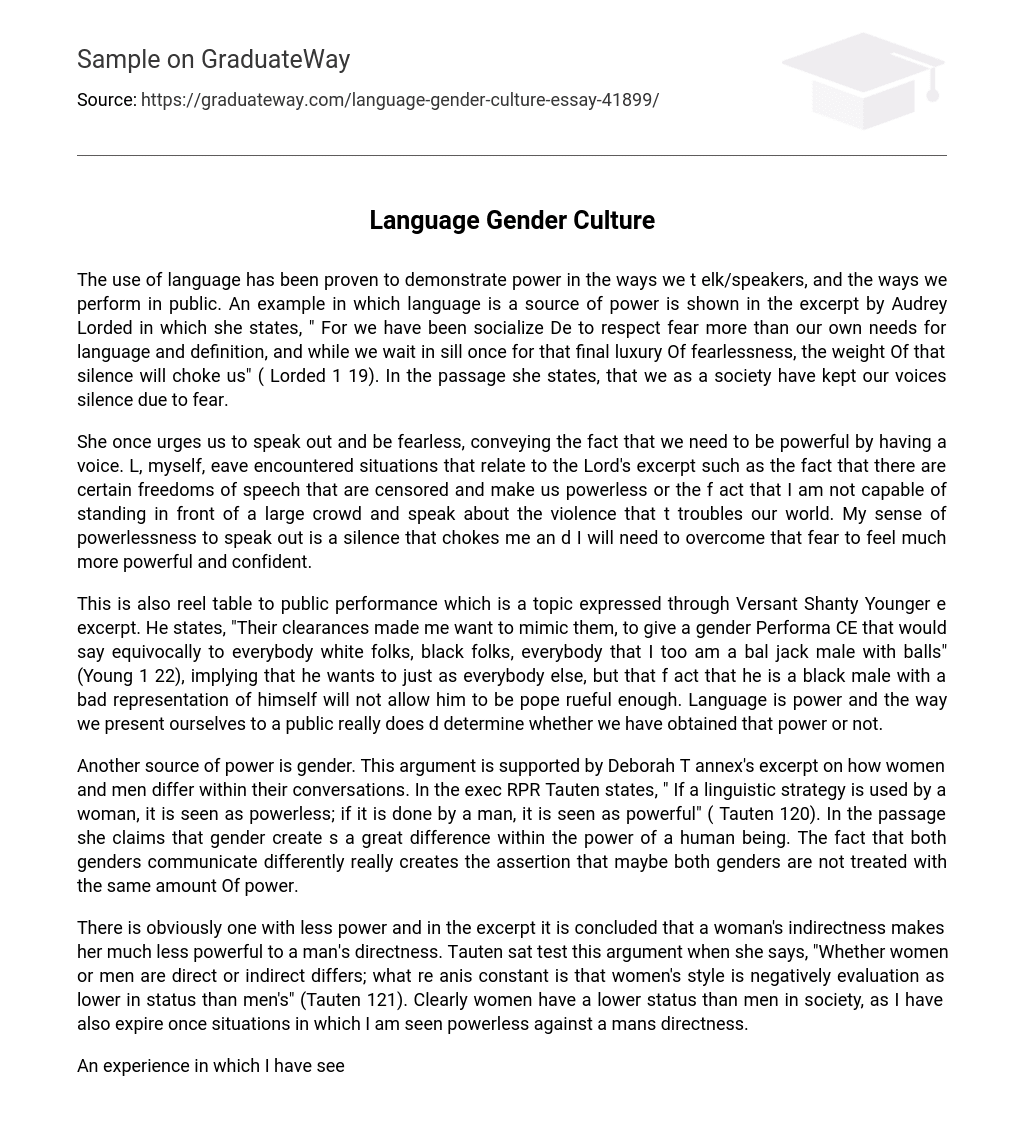The use of language has been proven to demonstrate power in the ways we t elk/speakers, and the ways we perform in public. An example in which language is a source of power is shown in the excerpt by Audrey Lorded in which she states, ” For we have been socialize De to respect fear more than our own needs for language and definition, and while we wait in sill once for that final luxury Of fearlessness, the weight Of that silence will choke us” ( Lorded 1 19). In the passage she states, that we as a society have kept our voices silence due to fear.
She once urges us to speak out and be fearless, conveying the fact that we need to be powerful by having a voice. L, myself, eave encountered situations that relate to the Lord’s excerpt such as the fact that there are certain freedoms of speech that are censored and make us powerless or the f act that I am not capable of standing in front of a large crowd and speak about the violence that t troubles our world. My sense of powerlessness to speak out is a silence that chokes me an d I will need to overcome that fear to feel much more powerful and confident.
This is also reel table to public performance which is a topic expressed through Versant Shanty Younger e excerpt. He states, “Their clearances made me want to mimic them, to give a gender Performa CE that would say equivocally to everybody white folks, black folks, everybody that I too am a bal jack male with balls” (Young 1 22), implying that he wants to just as everybody else, but that f act that he is a black male with a bad representation of himself will not allow him to be pope rueful enough. Language is power and the way we present ourselves to a public really does d determine whether we have obtained that power or not.
Another source of power is gender. This argument is supported by Deborah T annex’s excerpt on how women and men differ within their conversations. In the exec RPR Tauten states, ” If a linguistic strategy is used by a woman, it is seen as powerless; if it is done by a man, it is seen as powerful” ( Tauten 120). In the passage she claims that gender create s a great difference within the power of a human being. The fact that both genders communicate differently really creates the assertion that maybe both genders are not treated with the same amount Of power.
There is obviously one with less power and in the excerpt it is concluded that a woman’s indirectness makes her much less powerful to a man’s directness. Tauten sat test this argument when she says, “Whether women or men are direct or indirect differs; what re anis constant is that women’s style is negatively evaluation as lower in status than men’s” (Tauten 121). Clearly women have a lower status than men in society, as I have also expire once situations in which I am seen powerless against a mans directness.
An experience in which I have seen myself in such situation has been when I have indirectly commanded people to do a certain task and it was not obeyed until a man directly restated when had said. It was very pop rulers of me to command using indirectness and it really created a sense of weakness. Gender RSI differ in power due to their use of direct and indirectness. Culture has great amounts of influence. It has been proven through the excerpt opts of Lorded, Young Tauten, Naomi Greeter, and Natalie Sardinian that culture is the base o f how we view ourselves and how we create our own powerfulness.
In the excerpt His Politeness is Her powerfulness by Deborah Tauten it is stated , ” But far more cultures in the world use Elba orate systems of indirectness than value directness” (Tauten 121 ), which infers that powerlessness is much more common culture based. In The Barbershop by Versant Young he states, ” Literacy habits, like reading novels of a certain kind and speaking what might appear t o be standard English, have always made me seem more queer, more white identified, and more middle class than I am” (Young 1 24), which clarifies how his culture and who he is make hi m much more queer and misclassified.
He infers that he has gained power by the way he act s and the way he looks which are culture based traits. The article The Color of Family Ties: Race, Class, Gender, and Extended Family Involvement by Naomi Greeter and Natalie Sardinian tells us about how minority families have weaker ties and are more fragmented than white family sees. The research they made of the differences between cultures lead us to the conclusion that ultra have a lot to do with the powerfulness of a person or group of individuals raised upon the same ideals.
In the excerpt it is stated that, ” When discussing in family experiences of various arc ill and ethnic groups, commentators often assume that these differences can be traced to c ultra differences or competing, “family values”( Greeter 3), implying that these differences can be expressed in positive or negative ways creating a wave of power or powerlessness depends Eng on the family values. Culture defines a person and a persons or social groups identity there fore it leads to the obtainment of power. Language, gender and culture demonstrate various ways in which power is ex pressed to society and individuals.





